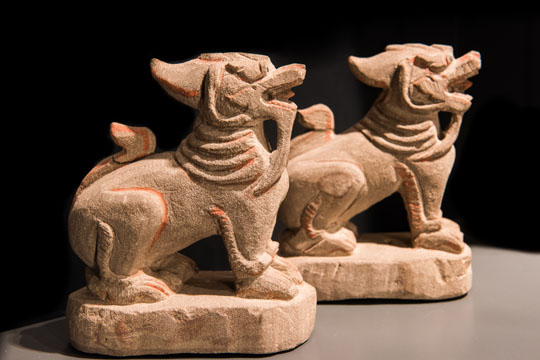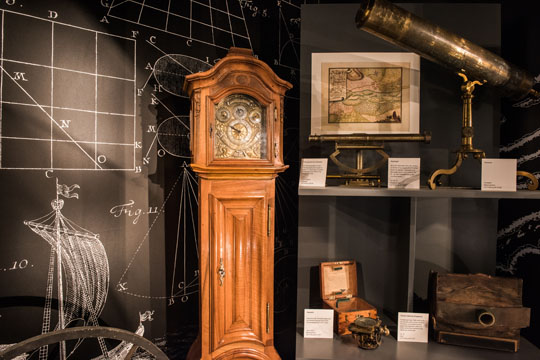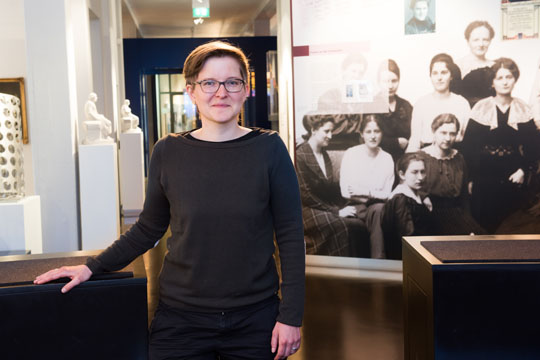Will Wonders Never Cease
Freiburg, Mar 26, 2018
A Burmese stone dragon, instruments for measuring angles, and a small 16th century bronze statue of Zeus slinging thunderbolts are all in the “cabinet of curiosities” at Uniseum Freiburg – the Forum and Museum of the University of Freiburg. The curio collection includes around 40 items ranging from ethnological artifacts to measurement instruments and works of art. Students use self-developed audio guides to inform visitors about the history of the exhibits.
 Well roared: The stone dragons come from Burma.
Well roared: The stone dragons come from Burma.
Photo: Klaus Polkowski
“The exhibits reflect the diversity of earlier research collections of the University of Freiburg,” explains Uniseum Curator Angela Witt-Meral. “Putting them together picks up on the idea of the cabinet of curiosities,” she continues. Since 2016, the historian has been supervising the three-year project “Forschendes Lernen” or learning through research. During the winter semester of 2017-2018, Witt-Meral decided to work with students to revamp the chamber. What’s been missing up to now is context for the exhibits. They’re located in six showcases in the chamber. The odd, valuable and sometimes disturbing objects stand alongside each other seemingly without rhyme or reason, as fits the idea of a curio cabinet. All that’s been available to visitors up to now has been information about their material composition and age.
 The Telescope, the instruments for measuring angles and the grandfather clock are reminiscent of the cabinet of a world explorer.
The Telescope, the instruments for measuring angles and the grandfather clock are reminiscent of the cabinet of a world explorer.
Photo: Klaus Polkowski
Discussing and reorganizing contents
During the winter semester, nearly thirty students from different disciplines went to work to close the informational gaps with audio. The team wrote informational texts on exhibits in the chamber and then used those to compile an audio guide. Working with Witt-Meral as teachers are Prof. Dr. Sylvia Paletschek of the Department of History, Professor of Ethnology Gregor Dobler and Media Instructor Matthias Baumann.
“The students organized into seven working groups fairly quickly. They also relied on various source media, such as collection documents or secondary literature,” reports Dobler. They also called other museums to obtain additional information. One group was responsible for the introductory text. The others each took on one of the display cases. The teams then presented their texts in the group, discussed them, and edited according to the feedback received. “There was a real, lively exchange of ideas. It even led to us discussing reorganizing the contents of the display cases,” says Witt-Meral. Following the seminar, for example, they removed human remains that had been part of the exhibition until then.
New names, new approaches
Marie Vetter, who studies liberal arts and sciences at University College Freiburg says, “It’s really exciting to see our knowledge and work being practically applied immediately.” Fellow student Lea Sayer, who’s studying history, likes the fact that she could get a taste of museum work. Sayer says, “Writing texts for the public is much more motivating than writing homework essays that end up in a box somewhere.” Another young historian, Elisabeth Schmitz, adds, “I’ve been studying at Freiburg since 2013. This is the first program offering of this kind that I’ve noticed.” Everyone who took part said they found working as they did liberating in comparison to working through a fully packed syllabus.” “The more we became involved with it, the more pieces of the puzzle there were – new names, new approaches. And little by little, a picture developed,” says history student Sven Zepf as he describes his experiences.
 Curator Angela Witt-Meral is proud of the student project: “The work of the seminar is also an added plus for the Uniseum,” she says.
Curator Angela Witt-Meral is proud of the student project: “The work of the seminar is also an added plus for the Uniseum,” she says.
Photo: Klaus Polkowski
The students said the class on media technology held to prepare for recording the audio guide was a veritable tight-rope walk between the complexities of audio engineering and the demands of popular communication. Nevertheless, recording the guide was a high point for all of them. Lea Sayer sums up, “We produced and completed something in such a short time.” Angela Witt-Meral agrees, “The work of the seminar is also an added plus for the Uniseum.”
Alexander Ochs

